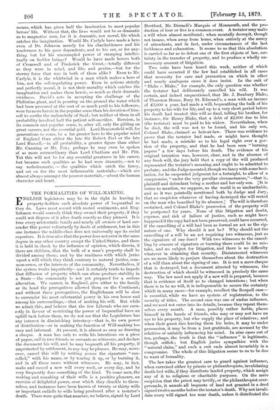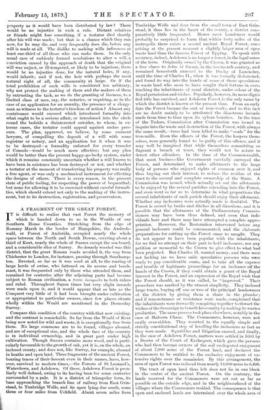THE FORMALITIES OF WILL-MAKING.
ENGLISH legislators may be in the right in leaving to property-holders such absolute power of bequeathal as they do. Laws must accord with rooted sentiments, and Eng- lishmen would scarcely think they owned their property, if they could not dispose of it after death exactly as they pleased. It is true every aristocratic family and nearly all owners of land sur- render this power voluntarily by deeds of settlement, but in this one instance the middle-class does not universally ape its social superiors. It is true also that the power does not exist in the same degree in any other country except the United States, and there it is held in check by the influence of opinion, which directs, if there are children, that the bulk of a man's property shall be divided among them; and by the readiness with which juries upset a will which they think contrary to natural justice, com- mon-sense, or the interests of the community. Nevertheless, if the system works imperfectly—and it certainly tends to impede that diffusion of property which can alone produce stability in a State—the community is not yet prepared for a serious alteration. We cannot, in England, give either to the family or its head the prerogatives allowed them on the Continent; and without these prerogatives, the Englishman will be slow to surrender his most substantial power in his own house and among his surroundings,—that of making his will. But while we admit this, and believe that the few Liberals who are earn- estly in favour of restricting the power of bequeathal have an uphill task before them, we do not see that the Legislature has any interest in diminishing intestacy—that is, its own power of distribution—or in making the function of Will-making too easy and informal. At present, it is almost as easy as drawing a cheque. A man has only to write his intentions on a piece of paper, call in two friends or servants as witnesses, and declare the document his will, and he may bequeath all his property, if unprotected by settlement, in any way he pleases. He may, more- over, cancel this will by writing across the signature "can- celled," with his name, or by tearing it up, or by burning it, and in all these cases without witnesses. He may, in fact, make and cancel a new will every week, or every day, and he very frequently does something of the kind. To some men, the making and remaking of their wills is a positive pleasure, an exercise of delightful power, over which they chuckle to them- selves, and instances have been known of twenty or thirty wills or important codicils to wills being produced after a testator's death. There were quite that number, we believe, signed by Lord
Hertford, Mr. Disraeli's Marquis of Monmouth, and the pro- duction of four or five is a common event. A testator may make a will when almost moribund; when mentally decrepit, though not insane, when away from home, when entirely at the mercy of attendants, and in fact, under circumstances of the last feebleness and exhaustion. It seems to us that this absolutism is carried so far as to defeat one of the first objects of law, cer- tainty in the transfer of property, and to produce a wholly un- necessary amount of litigation.
Two suits have been heard this Week, neither of which could have occurred if the law had established in all cases that necessity for care and precaution on which in other and nearly analogous cases it does insist. In the suit of " Blake v. Blake," for example, the only question was whether the testator had deliberately cancelled his will. It was certain, and indeed unquestioned, that Mr. J. Banbury Blake, of Thurston House, Bury St. Edmund's, a man with an income of £3,000 a year, had made a will, bequeathing the bulk of his property to his wife for life, and up to a very short period before his death had treated this will as final, telling his brother, for
instance, Sir Henry Blake, that a debt of E2,000 due to him (the testator) must be paid to his widow. Nevertheless, when he died, the will was not to be found, and his only son, Colonel Blake, claimed as heir-at-law. There was evidence to prove that the testator had made, or might have thought he had made, a mistake as to his legal right over a por- tion of the property, and that he had been seen " burning papers " a few days before his death. The evidence of his original intention was, however, clear, and in the absence of any fresh will, the jury held that a copy of the will produced represented the testator's meaning, and ought to be admitted to probate; and the Judge assented, though we fancy with some hesi- tation, for he suspended judgment for a fortnight, to allow of a compromise, " under the very peculiar circumstances,"—that is, plaintiff and defendant being a mother and her only son. [It is better to mention, we suppose, as the world is so uncharitable, and as it was pointedly mentioned both by Judge and Jury, that no suspicion whatever of having destroyed the will rested on the man who benefited by its absence.] The will is therefore sustained, and Colonel Blake's possession of the property will be postponed for years. None of this litigation and doubt, expense, and risk of failure of justice, such as might have happened if the copy had not been preserved, could have occurred, if the cancelling of a will had been as formal an act as the sig- nature of one. Why should it not be ? Why should not the cancelling of a will be an act requiring two witnesses, just as the signature of one does P With two witnesses to the cancel- ling by erasure of signature or burning there could be no mis- take, and no subject for litigation, and there is no difficulty whatever in obtaining that security. Disinterested witnesses are no more likely to perjure themselves about the destruction of a will than about the signing of one. It is not a mere cheque that is destroyed, but a document attested by witnesses, the destruction of which should be witnessed in precisely the same way. The law need not apply if a new will is prepared, because that is evidence of itself as to changed intentions ; but when there is to be no will, it is indispensable to secure the certainty which in many cases—for example, recollect the Roupell ease- ls essential, while we have no system of registration, to the security of titles. The second case was one of undue influence, and we need not enter into its details, because they repeat them- selves every month. A man, possibly rather feeble, places himself in the hands of friends, who may or may not have an eye to his property, but who supply the place of relatives ; and when their guest dies leaving them his heirs, it may be under persuasion, it may be from a just gratitude, are accused by the relatives of unfairly influencing his mind. In nine cases out of ten, perhaps, the truth is that the " influence " is legitimate, though selfish ; but English juries sympathise with the " natural claim," and such a suit ends almost invariably in a compromise. The whole of this litigation seems to us to be due to want of formality.
The law takes the greatest care to guard against influence, when exercised either by priests or philanthropists, invalidating death-bed wills, if they distribute landed property, which assign any of it to religious or charitable purposes. On the mere suspicion that the priest may terrify, or the philanthropist over- persuade, it annuls all bequests of land not granted in a deed signed twelve months before the testator's death. Why not invali- date every will signed too near death, unless it distributed the property as it would have been distributed by law P There would be no injustice in such a rule. Distant relatives or friends might lose something, if a testator died shortly after his will was made ; but that is a chance which they run now, for he may die, and very frequently does die, before any will is made at all. The dislike to making wills influences at least one-third of all those who can make them. In the only usual case of suddenly formed resolutions to alter a will, a conviction caused by the approach of death that the original will was unjust, or ill-tempered, or likely to be injurious, there would be no injustice done, for the natural heirs, if any, would inherit; and if not, the heir with perhaps the most natural right of all, the community at large. Or if the total prohibition of such wills is considered too arbitrary, why not protect the making of them and the makers of them by entrusting the task, as we do the granting of licences, to a limited class of men, say, the notaries, or requiring, as in the case of an application for an annuity, the presence of a clergy- man as witness to the testator's freedom of action P Almost any contrivance would succeed which introduced formality into what ought to be a serious affair, or introduced into the circle round the bedside a disinterested outsider, to whom, in ex- treme cases, the testator could appeal against undue pres- sure. The plan, approved, we believe, by some eminent lawyers, of compelling the deposit of a will with some registrar or notary, and an application for it when it was to be destroyed—a formality enforced for every transfer of Consols—would be much more effective; but any plan would be better than the present happy-go-lucky system, under which it remains constantly uncertain whether a will known to have been in existence has been destroyed or not, and whether a testator at the moment of transferring his property was really a free agent, or was only a mechanical instrument for effecting the designs of others. There is every reason, in the present state of public feeling, for respecting the power of bequeathal; but none for allowing it to be exercised without careful formali- ties, which should extend not only to the making of the instru- ment, but to its destruction, registration, and preservation.



































 Previous page
Previous page